Voice of the Islamic World in Kazan: Turkmenistan for the Great Silk Road, Malaysia — for halal
The Russia — Islamic World: KazanForum International Economic Forum has concluded its work in Kazan
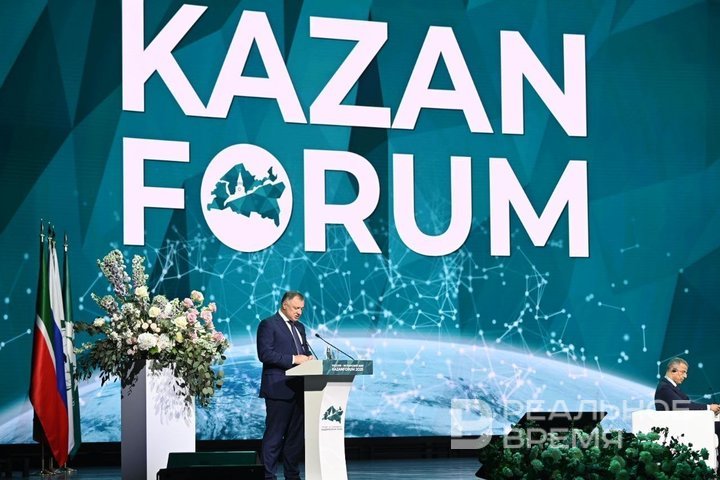
Tatarstan remains a solid bridge in strengthening the strategic partnership between Russia and the Islamic world, while Kazan serves as a meeting place for old friends — this special role of the republic in the pivot to the East was highlighted by the speakers. At the closing plenary session of the Russia — Islamic World: KazanForum International Economic Forum, Russian Deputy Prime Minister Marat Khusnullin pointed to the stability in relations with Muslim states; the national leader of the Turkmen people, Gurbanguly Berdimuhamedov, called for the revival of the Great Silk Road, implying the need to intensify movement along the eastern route of the North–South international transport corridor. And a new guest, Prime Minister of Malaysia Anwar Ibrahim, chose to speak in poetic epithets. Read more in the report by Realnoe Vremya.
Russia is always open to the Islamic World
“Our multiethnic country has for centuries remained open to broad interaction with the states of the Islamic world” — with these words began the greeting from the president of the country, Vladimir Putin, which was read out by Russian Deputy Prime Minister Marat Khusnullin following the recitation of the Quran at the plenary session of the Russia — Islamic World: KazanForum International Economic Forum. The message was brief, yet meaningful and encouraging. In it, the head of state expressed readiness to expand cooperation with Islamic countries in all areas. “Even today, despite the challenging situation, we continue to successfully and steadily broaden our economic, scientific, educational, humanitarian, and interregional ties,” listed Marat Khusnullin.
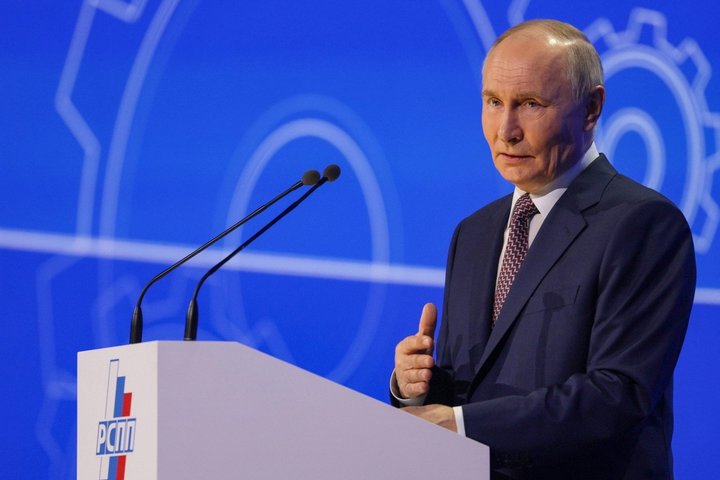
At the same time, Vladimir Putin highlighted the special role of the republic in maintaining contacts with Muslim states. “Tatarstan is one of those regions of Russia that most actively builds such fruitful and constructive relations,” said the Russian deputy prime minister. It was clear that at the highest level, the long-standing efforts of Minnikhanov’s team — which has established direct ties with the Arab world and the leaders of Central Asian states — are highly valued. Following the call to “discuss prospects,” came an appeal to “ensure the harmonious development of the global community and effectively counter modern security threats such as terrorism, extremism, escalation, and local conflicts.”
The plenary session was moderated by Abdelilah Belatik, Secretary General of the General Council for Islamic Banks and Financial Institutions (CIBAFI).
Why the Great Silk Road is needed
“The Islamic world has every opportunity to become one of the engines of global development. But Turkmenistan would like to cooperate on an equal footing, not on the basis of one-sided relations,” stated the national leader of the Turkmen people, Gurbanguly Berdimuhamedov, speaking about the prospects of cooperation with Russia. Amid geopolitical tensions, it is necessary to rethink “the roles of our countries as the foundation of a new world order” and move towards the implementation of large-scale breakthrough projects, he urged, calling for more decisive steps toward economic integration with Turkmenistan. “Our countries have excellent indicators in demographics, advantageous geographic positioning, and trade resources. The technological level is rising, and the scientific and educational sectors are strengthening. All this forms the prerequisites for launching major breakthrough projects in various fields,” he said. “In a strategic sense, such a belt could become a bridge to Asia,” he added.
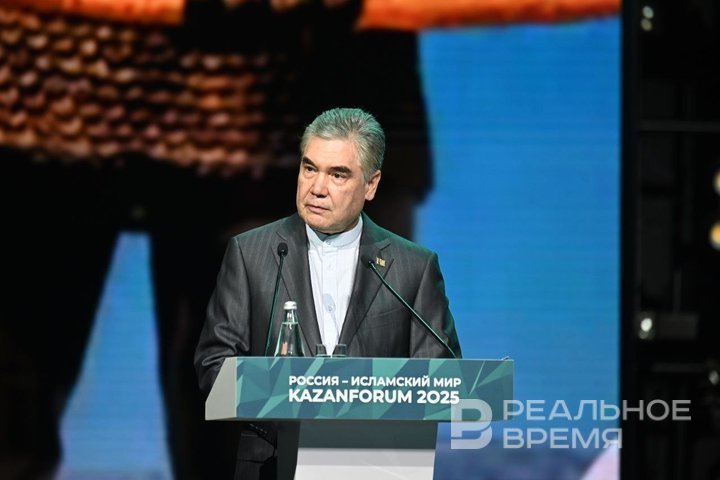
Gurbanguly Berdimuhamedov advocated for the revival of the Great Silk Road, referring to the need to activate trade flows along the eastern route of the Caspian through Kazakhstan, Turkmenistan, and Iran. “Turkmenistan’s approach to international economic cooperation is based on prioritising the transport and logistics sector. Islamic countries are called upon to organise a unified energy, transport, and technological belt across Eurasia. This approach will ensure the shortest routes for the supply of energy resources,” he stated. In this sense, the Islamic world will present a model of efficiency and appeal, ready to contribute to the strengthening of logistical connections.
On the other hand, he cautioned against making one-sided decisions when selecting transport routes. “Turkmenistan’s position is to uphold equality in global processes. In particular, our country opposes unilateral approaches in energy and logistics, and insists on the need for their diversification to ensure broad international participation,” he emphasised.
Malaysian Prime Minister Reads Hadji Murat, and the country awaits tourists from Russia
Special interest was drawn to the speech of Malaysian Prime Minister Anwar Ibrahim. The day before, he had returned from Moscow, where he held talks with the president of Russia. What brought him to Kazan? Members of the delegation, speaking ahead of his address, shared that Malaysia is focused on expanding the tourist flow, and during the Moscow visit, an agreement was reached to launch direct air service from Russia to Kuala Lumpur. “Aeroflot will operate flights on this route,” said one of the Malaysian government officials.
However, the prime minister himself did not mention this at all. Instead, he focused on the political agenda. According to him, Tatarstan and Russia are changing history today — they are among the leading voices of the Muslim world.
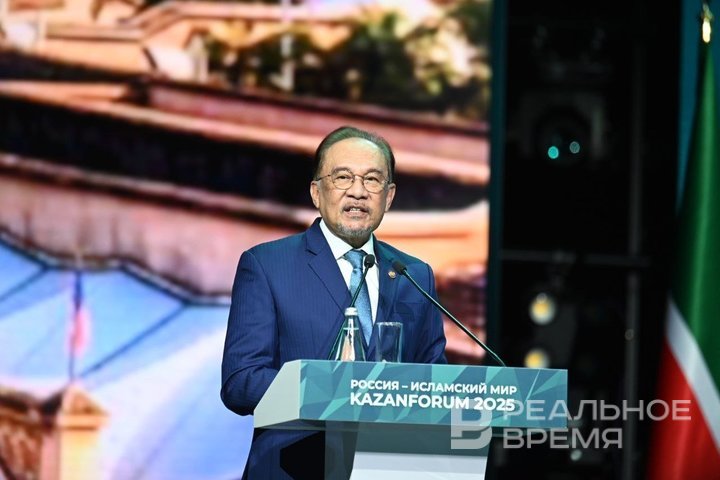
He drew an analogy between the history of the Tatar people and Leo Tolstoy’s novella Hadji Murat. “Today, we are on Tatar land. Who else could describe that strength, brilliance, and energy as Lev Tolstoy did in his great work Hadji Murat? What energy! What strength! He described the people and their resilience, loyalty, toughness, a strong will that overcomes everything. But the Tatar people have always stood firm and never surrendered to anyone. I honour you, esteemed Rais, and your people. We continue to see this spirit in Tatarstan and Russia, which is changing history and is also one of the leading voices of the Muslim world. By strengthening economic cooperation, it is embarking on a new path. This includes food security, digital development, petrochemicals, and much more. I admire your dynamism and energy, people of Tatarstan! Let us learn from each other and build on these strong competencies,” said Anwar Ibrahim.
Kazan brings friends together
Turning to the business agenda, he stated that he sees prospects in advancing the halal industry. In his view, this market will reach billions.
Rustam Minnikhanov responded by expressing gratitude for their visit and their affection for Kazan. “We are grateful for your attention and participation. It is a great honour for us,” he said, addressing the honoured guests.
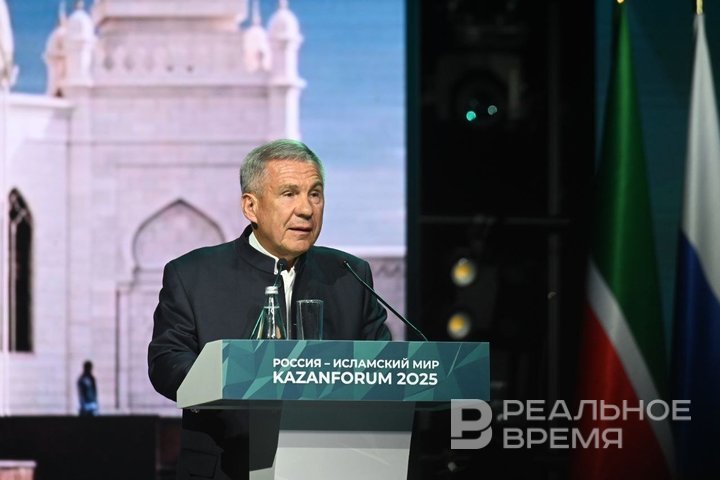
“KazanForum brings together friends from around the world, creates favourable conditions for new contacts, and opens doors for concrete cooperation projects,” he said. According to him, the pace of development in cooperation between Russia and Muslim countries is now accelerating significantly. Joint projects are being implemented with partners from Central Asia, the Middle East, Asia, and Africa. He also reminded that next year Kazan will become the cultural capital of the countries of the Organisation of Islamic Cooperation. Trade turnover with these countries increased by 38%, reaching approximately $8 billion. Only at the very end did the guests begin sharing successful digitalisation practices, proving that the stereotype of technological backwardness is outdated and that the Islamic states themselves have long become modern.”
Tatarstan
